Featured
Changing India’s Sports Narrative: Introducing S4D
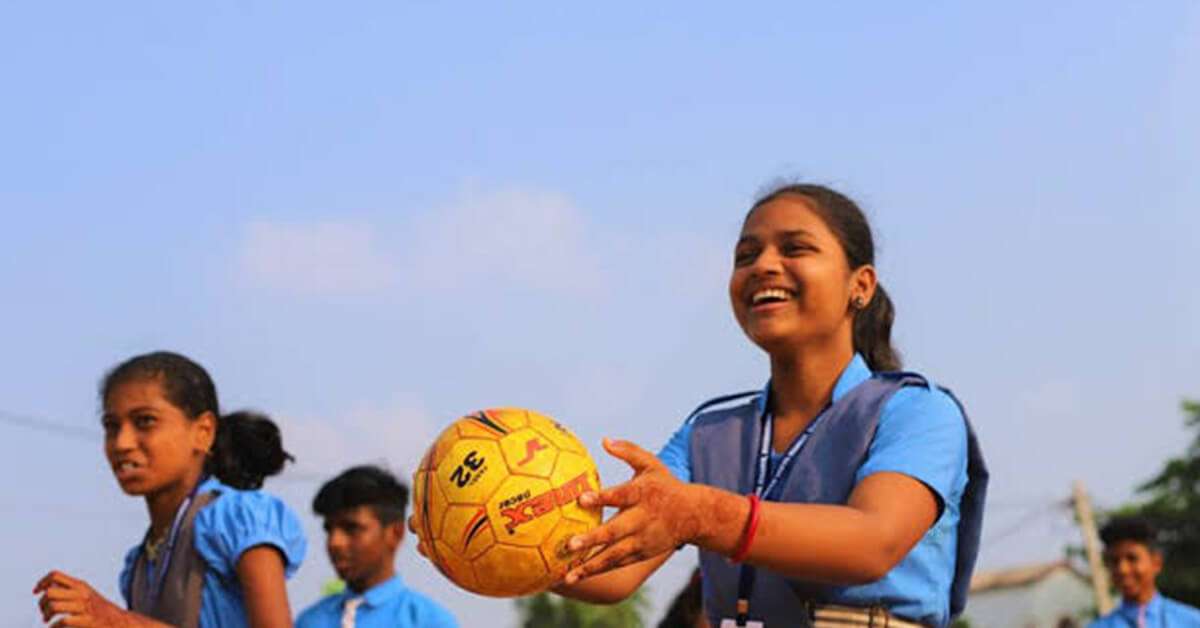
The article was first published on The Bastion
Authored by Suheil Farrell Tandon and Antony CJ
Ever since Pratyush*—an under-confident 14-year-old boy residing in the slum settlements of Bhubaneswar—had joined a mixed-gender Sports for Development (S4D) program, his attitude towards school and his peers had changed considerably. His teachers observed a remarkable difference in his personality and confidence.
Earlier, he never spoke to girls and was very inactive in class. But since the sports program has been implemented in school, his confidence has increased and he has started to talk to more people, including girls. I believe the main reason for this is that the program has been mixed gender activities which have improved the communication between boys and girls”, said Pratyush’s teacher.
What is S4D?
Sport for development (S4D) is defined by UNICEF as “the use of sport, or any form of physical activity, to provide both children and adults with the opportunity to achieve their full potential through initiatives that promote personal and social development”.
Interventions through sports have been a game-changing tool to bring about social change and inclusion among individuals and communities, especially those who are marginalised and underserved. Moreover, sport has been effective in providing life-long skills to enhance their quality of life and contribute towards their overall well-being.
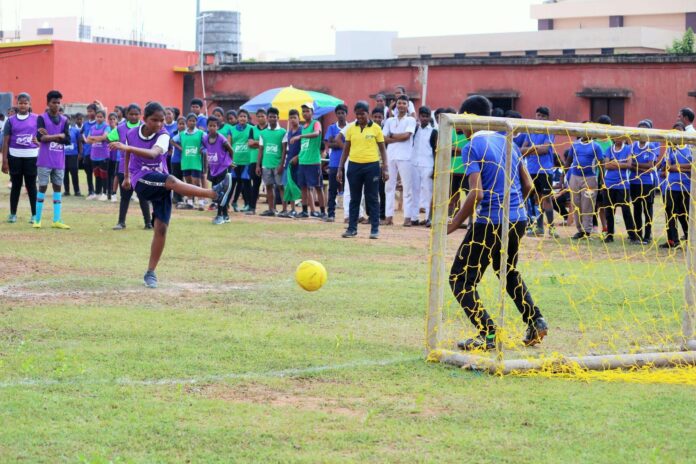
Mixed Gender Football Tournament 2019 in Bhubaneswar, organised by Pro Sport Development (PSD) and FARE Network.
On an international scale, sport has been recognized by UNESCO (International Charter of Physical Education and Sport, 1978) as a key development measure for the social and emotional development of youth. In a bid to highlight the role of sport in promoting education, health, development and peace, the United Nations General Assembly had declared 2005 as the International Year of Sport and Physical Education (IYSPE). More recently, sport and physical activity have been recognised as an important enabler to realising many of the UN’s Sustainable Development Goals (SDGs).
Why is Research in S4D is Crucial?
Evidence-based outcomes of S4D interventions must be researched and documented in order to make a multitude of stakeholders aware of its benefits. This is especially true in the context of India, where sport is still seen through a narrow lens—either in the context of excellence or employment (through sports quotas). Performance, results and medals in sporting events dominate the agenda, hereby leaving behind discussions on the lifelong values of sport and the social outcomes associated with it.
Success stories and stories of change of individuals through sport interventions have complemented the impact of S4D initiatives. Rigorous research and scientifically proven methodologies ascertaining the impact of sports would be pivotal in moving the S4D agenda forward and to deliver effective programs within the country.
How can S4D Benefit the Youth?
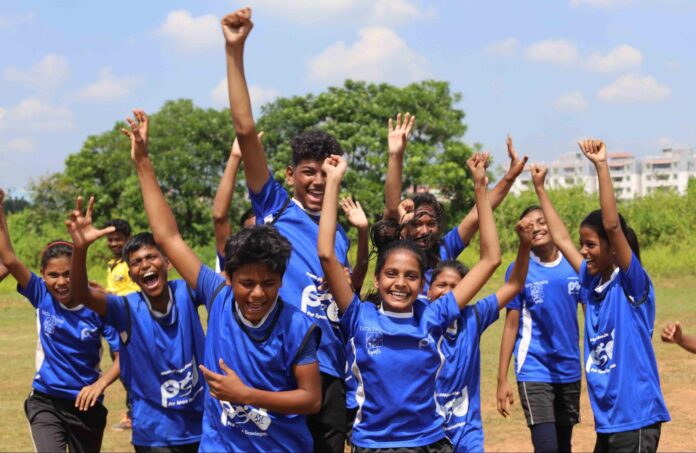
A study by Public Health England, an organisation working on public health advocacy, found that physical activity participation among children aged 5 to 11 years had a positive impact on cardiometabolic health, muscular strength, cardiorespiratory fitness, self-esteem, anxiety, academic achievement, cognitive functioning, attention/concentration, confidence, and peer friendship. This study provides a comprehensive overview of the holistic benefits of participating in sport and physical activity. But how far have we progressed?
The World Health Organisation (WHO) in its factsheet on physical activity states that “globally, 81% of adolescents aged 11-17 years were insufficiently physically active in 2010. Adolescent girls were less active than adolescent boys, with only 78% as compared with 84% of boys”.
The implementation of sports and physical activity curriculum can lead to good health (Sustainable Development Goal 3—Good Health & Well Being), in children and youth, higher grades in academics (Sustainable Development Goal 4—Quality Education), and decreased psychological and mental ailments. Moreover, S4D initiatives provide a platform to combine long term skill development like communication, respect for the opposite gender and responsible decision making.
The global research indicates that sport has a positive impact, particularly on female participants (Sustainable Development Goal 5—Gender Equality). Studies have shown that providing adolescent girls and young women with more sporting opportunities help them make responsible decisions and furthermore, secure a better future and contributing actively to their communities.
In developing countries, sport has been crucial in providing employability and poverty reduction (Sustainable Development Goal 1). A special case of Mathare Youth Sports Association is a great example of S4D intervention which led to the socio-economic growth of marginalised children in Kenya. Participants in a sports session can gain a whole lot from it, for example, it can act as an educative platform for spreading awareness on human rights, including the right to an adequate standard of living and the equal rights of women.
How Comprehensive is S4D Research in India?
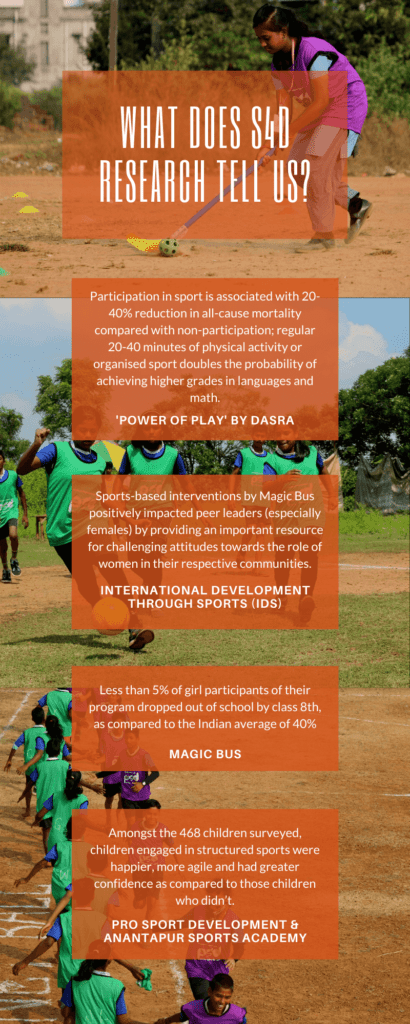
Research in S4D in India is primarily driven either by those organisations implementing programs on the ground, or funders who are based outside the country. There is little research undertaken by universities, think tanks and consultancies about the Indian context, as compared to the global North. There needs to be a concerted effort by various stakeholders in India to ensure that evidence for S4D globally also starts being informed from the global South.
What are the Challenges to Conducting S4D Research in India?
With a significant section of the Indian audience consuming sports primarily for entertainment, awareness of sports in Indian households is limited to either elite performance or children participating in schools. In general, awareness about the positives outcomes of sport and its values, and its power in effecting social change is in the primitive stage in India. This then impacts the research being undertaken in the sports industry, with the same being restricted to commercial data primarily relating to elite sport and the consumption of elite sport by consumers.
In general, there is a lack of proper coordination amongst the centre, state, federations and various private and public sector undertakings in the sports sector in India. The sports budget of the central government has been increasing steadily but the question is if they are allocating the same to reach the grassroots? The share of the budget towards the sports federations have increased in the last decade, however, it has been used primarily to send athletes for competitions abroad and for holding national and international competitions. The lack of coordination among Indian stakeholders in the sport industry and the utilization of public funds towards elite sports limits the interest and resources available for research of sport at the grassroots and in studying its socio-economic impact.
The focus on physical education has been limited to an hour a week in most schools and often without any structured and monitored curriculum, leading to a sparse interest in sport among the children and youth. More focus is given to academics than sports, hence diluting the interest of stakeholders in investigating the impact of sports at the school level. Even if there is interest, it is limited to the physical impact of sports, rather than the holistic impact on other social, emotional and cognitive indicators.
How can S4D Research be Improved in India?
To make S4D an important agenda in India will require collective action from the different stakeholders. This requires adequate attention and resource allocation from the government as well as private players on programs that focus on the positive values inculcated by sport rather than only medals and podium finishes. A major component of this is the research required to understand and document the impact of such interventions, as well as using the findings of the research to advocate for S4D.
The funders of S4D initiatives need to look far ahead and develop long term effective plans for sustainable programs. This would give more time for sports-based intervention to set in among the beneficiaries. Making mandatory research and evaluations of S4D initiatives a part of the CSR (Corporate Social Responsibility) collaborations will also be a step forward.
Long-term program mapping of the beneficiaries is important for making the program delivery effective. A mutual understanding between the organisation and participants to keep track of progress after completion of interventions will be quite useful in ascertaining the long term impact of S4D initiatives. India being a vast country with various cultures and identities, program delivery modules in region-specific language will drastically improve effectiveness and information exchange. The continuous monitoring and evaluation of the programs delivered on the ground are integral for meeting the ideal program goals.
More recently, the Ministry of Youth Affairs and Sports, India launched grants to focus on research and publication in the field of sports and games. It will be quite interesting to infer the long term effects of sports on participants. A similar initiative by the government introducing National Sport University in New Delhi is a good move. However, such initiatives need to focus on quality research with a focus on high-performance sport but also grassroots sports and S4D, to enhance our holistic understanding of sport as a nation.
*The name has been changed to protect the identity of the person.
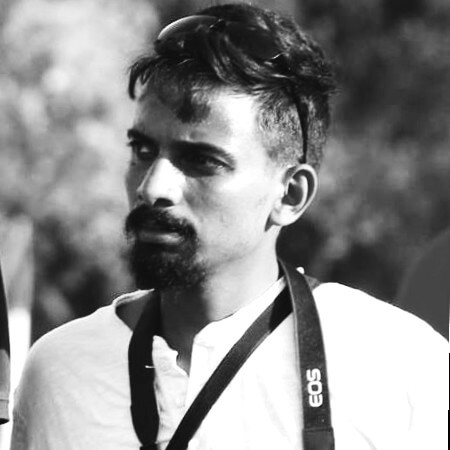
ANTONY CJ AUTHOR
Communications Officer,
Pro Sport Development
Email: [email protected]
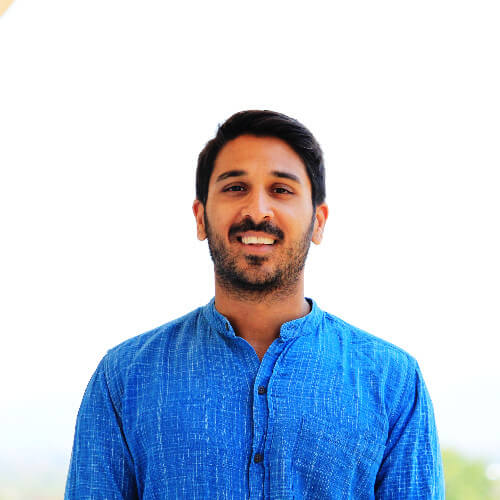
SUHEIL TANDON AUTHOR
Director-Founder,
Pro Sport Development
Email: [email protected]






